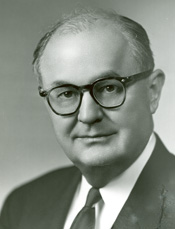Wright Patman
| Wright Patman | |
|---|---|
 |
|
| 40th Dean of the United States House of Representatives | |
|
In office January 1973 – March 1976 |
|
| Preceded by | Emanuel Celler |
| Succeeded by | George H. Mahon |
| Member of the U.S. House of Representatives from Texas's 1st district |
|
|
In office March 4, 1929 – March 7, 1976 |
|
| Preceded by | Eugene Black |
| Succeeded by | Sam B. Hall |
| Member of the Texas House of Representatives from the 1st district | |
|
In office 1921–1925 |
|
| Preceded by | J. D. Newton |
| Succeeded by | George W. Coody |
| Personal details | |
| Born |
John William Wright Patman August 6, 1893 Hughes Springs, Texas |
| Died | March 7, 1976 (aged 82) Bethesda, Maryland |
| Political party | Democratic |
| Spouse(s) | Merle Connor Pauline Tucker |
| Religion | Baptist |
John William Wright Patman (August 6, 1893 – March 7, 1976) was a U.S. Congressman from Texas in Texas's 1st congressional district and chair of the United States House Committee on Banking and Currency (1963–75). A self-styled "populist" he energetically attacked the banks, the banking system, and the Federal Reserve system. He sponsored the Robinson-Patman Act of 1935. It was designed to protect small retail shops against competition from chain stores by fixing a minimum price for retail products.
Patman was the son of John N. and Emma (Spurlin) Patman, was born near Hughes Springs in Cass County, Texas, on August 6, 1893. After graduating from Hughes Springs High School in 1912, he enrolled in Cumberland University Law School in Lebanon, Tennessee. Receiving his law degree in 1916 he was admitted to the Texas bar the same year. During World War I Patman enlisted in the United States Army as a private. He later received a commission as a first lieutenant and machine gun officer in the Texas Army National Guard's 144th Infantry Regiment, a unit of the 36th Division. He remained in the National Guard for several years after the war.
Patman was elected to the Texas House of Representatives in 1920. He left the House in 1924 when he was appointed district attorney of the fifth judicial district of Texas.
In 1928, Patman was elected to the House of Representatives in Texas's 1st congressional district. In 1932, Patman introduced a bill that would have mandated the immediate payment of the bonus to World War I veterans. It was during the consideration of this bill that the Bonus Army came to Washington. Patman was a supporter of the New Deal.
...
Wikipedia
